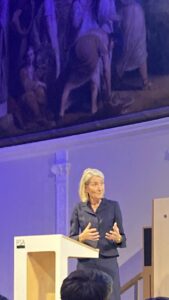I had the joy of hearing Professor Amy Edmondson (of Harvard Business School and doyenne of ‘failure’ research) speak at the RSA last week, elaborating on her typology of failure (basic, complex, and intelligent) and a set of guiding principles for organisational systems in attending well to it.
Amy was introduced by Tim Harford who published ‘Adapt’ at the same time as I had my own ‘failure’ awakening through the RSA’s ‘Glory of Failure’ project.
Tim was humble in calling out the limitations of the ‘failure-woo!’ entrepreneurial zeitgeist that still has a palpable legacy in the 10 years since; Amy’s first message was for all of us to remember that context is key.
Yes experimentation, innovation, learning; but we have a responsibility to limit the ‘damage’ of unnecessary failure by paying attention, learning from prior knowledge and making the scale of deliberately uncertain activities as small as humanly possible.
Amy told a beautiful set of stories from her research. All thought-provoking and something to take on in each.
Yet it was her final insight that was most profound to my mind.
“Everything is a hypothesis and an experiment. Even in the most seemingly predictable, repetitive environments, we need to think in this way so that it doesn’t catch us unawares.”
Amy described it as a radical position, yet it absolutely comes with all her depth of understanding.
To my mind, it’s a call for all of us to be engaged and pay attention; and yes this has radical implications in both ‘the attention economy’ and in how we design work.
All jobs do in fact require our engagement and critical thinking; the time to notice and pay attention; the structures that allow for a generative response.
That then raises questions of how we value seemingly rote and repetitive roles with the need to pay people more to be more engaged; and how we structure work in all roles to be able to notice what’s occurring.
The case research and the principles that Amy drew out of her talk are significant contributions to how we might lead into healthy workplaces. Ways of framing how we talk about what is unknown, what is it to be human, how to work together in turbulent times.
It is also part of a bigger body of knowledge and practice in the transition to workplace cultures that are more fit for our changing contexts. That enable us to collectively understand, make sense of, and find purposeful pathways for change.
